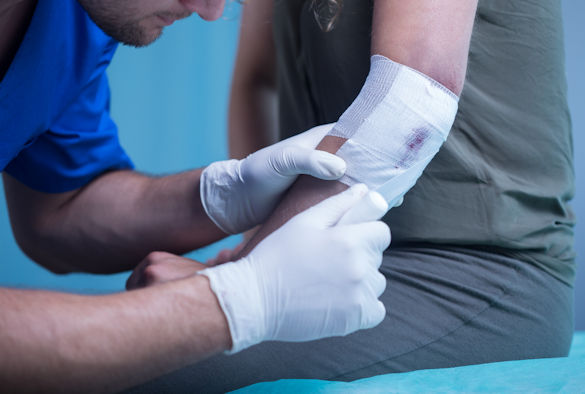
Researchers at the University of Liverpool have been awarded £1.2M by the Engineering and Physical Sciences Research Council (EPSRC) to develop a new type of bandage to treat infections without the use of antibiotics in order to help tackle antimicrobial resistance.
The funding will support a new partnership, which includes clinicians and industry, who will work together to develop the viability of antimicrobial bandages and accelerate the bench-to-clinic impact of the proposed research.
Infections in acute surgical, traumatic and burn wounds can delay healing causing them to turn chronic. Chronic wounds affect 200,000 people in the UK at any one time, costing up to £3 billion per year in patient care.
Antimicrobial resistance is a global epidemic. In 2014 the World Health Organisation advised that the antibiotics we are reliant on are in danger of becoming obsolete and new technologies to fight infection are needed. It is estimated that by the year 2050, deaths attributed to antimicrobial resistance will claim up to ten million lives per year, surpassing those lost to cancer.
Dr Raechelle D’Sa, who is a biomedical engineer at the University, said: “In developing new technologies without using antibiotics, it is hoped that this project can have a wider commercial and societal benefit in terms of the impact on antimicrobial resistance, NHS resources and the quality of life of patients.”
“Ultimately, it is hoped to see the technology reach the stage where it can be taken to clinical trials. If successful, the technology developed will be world-leading as it does not lead to antimicrobial resistance and is revolutionary in its ability to treat infections.”
The project includes the Royal Liverpool Hospital and Johns Hopkins Medicine (USA), who bring complementary skills in wound infection and healing, alongside commercial partners including a world leading US nanomaterials company and a York based company at the forefront of skin technologies.
The University team consists of Dr Raechelle D’Sa and Dr Jenny Hanson from the School of Engineering, and Professor Rachel Williams from the Institute of Ageing and Chronic Disease